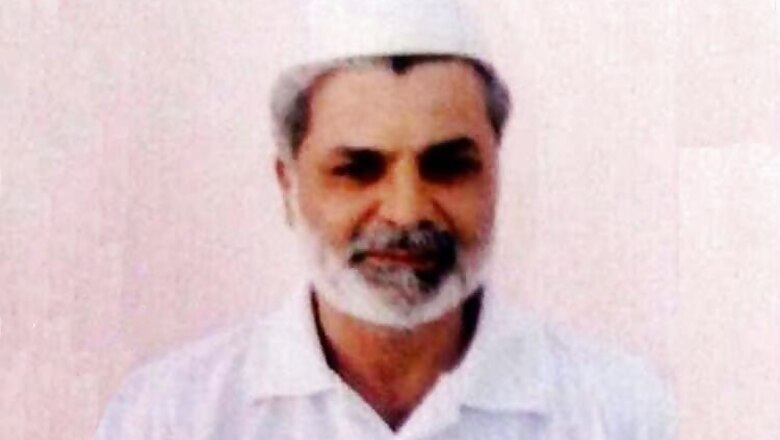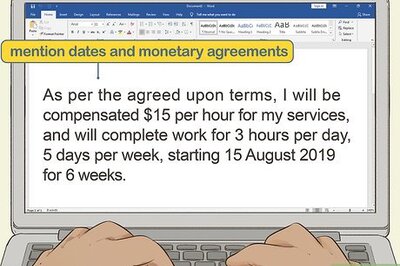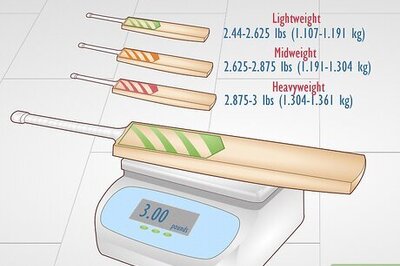
views
New Delhi: Yakub Abdul Razzak Memon, the lone convict to be sentenced to death in the 1993 Mumbai bomb blasts case, has been hanged to death in the Nagpur Central Prison. Memon was hanged at 6:43 AM on Thursday following a day of intense court room action and an unprecedented night long legal proceeding that saw the Supreme Court hearing and then rejecting his final mercy petition early on Thursday morning.
While dismissing his latest petition, Supreme Court judge Justice Dipak Misra, who headed the three-judge bench constituted in the intervening night of Wednesday and Thursday, said, "Stay of death warrant would be a travesty of justice."
The two other judges of the bench were Justices Amitav Roy and Prafulla Pant. It is the same three-judge bench which turned Memon's plea seeking a reconsideration of his death sentence. The bench observed that there was no error in the issue of death warrant sealing the fate of the 53-year-old Memon.
Entire Wednesday and early Thursday morning saw what perhaps Indian judiciary has never done. The petition was heard in Court Room 4 which was opened for an unprecedented 90-minute hearing that started at 3.20 AM and ended a little before dawn.
After Memon's mercy petition was rejected by the apex court on Wednesday evening followed by Maharashtra Governor Chennamaneni Vidyasagar Rao also doing the same and later in the night President of India, Pranab Mukherjee, too refusing to accept his mercy petition, the 1993 Mumbai blasts convict's lawyers knocked the doors of the Supreme Court once again late in the night.
Memon was hanged to death as per the TADA court's order on a day which coincidentally was also his 53rd birthday after the three-judge bench of the Supreme Court, constituted by the Chief Justice of India HL Dattu in the middle of the night, rejected his final mercy petition early on Thursday morning, just hours before the sentence was to be carried out.
The bench rejected the argument of Yakub Memon's lawyer that he must be given 14 days as mandated by the Supreme Court to meet family members, prepare his will and make peace with god before the execution of his death warrant.
Memon's lawyers petitioned the CJI for an urgent hearing to stay the hanging on the ground that 14 days time should be given to death row convict to enable him challenge the rejection and for other purposes. After consultations, the CJI constituted the same three-judge bench that had earlier decided on the death warrant issue to go into the late night plea.
The convict's lawyers led by Anand Grover said that the authorities were "hell bent" on executing Memon without giving him the right to challenge the rejection of his mercy petition by the President as right to life of a condemned prisoner last till his last breath. Grover said a death row convict is entitled to 14 days reprieve after rejection of mercy plea for various purposes.
Opposing Memon's plea, Attorney General Mukul Rohtagi contended that Memon's fresh plea amounts to abusing the system.
Dictating the order, Justice Misra said ample opportunity was granted to the convict after rejection of the first mercy petition by the President on April 11, 2014 which was communicated to him on May 26, 2014. He said the rejection could have been assailed before the Supreme Court.
Justice Misra observed that really ample time was granted after rejection of the first mercy petition to prepare himself for the last and final meeting with family members and all other purposes. "As a consequence, if we have to stay the death warrant it would be a travesty of justice," the bench said, adding that "we do not find any merit in the writ petition".
Further, it said while pronouncing the order on Wednesday "we have not perceived any error in the death warrant issued by the TADA court on April 30 for the execution on July 30. In the instant case, it is a clear expose of assertion of concept of justice in a totally different backdrop, the court said.
The bench said the AG had submitted that at the drop of a hat one can add new challenges and developments and expect the President to act in exercise of power under Article 72 and thereafter on rejection of clemency they would challenge that in a court of law. "We will be failing in our duty by allowing so," it said.
The court observed that on the first glance the submissions made on behalf of Memon looked attractive but on finer consideration the case of the convict does not carry much weight.
Reacting to the order, Grover said it was a tragic mistake and a wrong decision.
The AG said the legal process has come to an end and it was not a question of victory.
What Prison Manual Says about Hanging:
The Medical Officer of the prison shall work out the details of the length of the drop to be given to a prisoner on principles shown below:-
(i) if the prisoner weighs less than 100 lbs. or 45 kgs, he should be given a drop of 8 feet or 2.5 metres.;
(ii) If the prisoner weighs from 100 to 133 lbs. or 45 to 60 kgs, he should be given a drop of 7 feet 8 inches or 2.3 metres.
(iii) If the prisoner weighs more than 133 lbs. or 60 kgs, but not more than 166 lbs. or 75 kgs, he should be given a drop of 7 feet or 2.2 metres.;
(iv) if the prisoner weighs more than 166 lbs. or 75 kgs. but not more than 200 lbs. or 91 kgs, he should be given a drop of 6 feet 6 inches or 2 metres.;
(v) if the prisoner weighs more than 200 lbs. or 91kgs, he should be given a drop of 6 feet 1.83 metres.

















Comments
0 comment